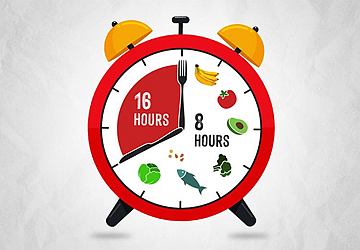Intermittent fasting is not just a modern trend; it has been practiced in various forms for centuries. By delving into the science of this fasting method, one can truly grasp its potential benefits and the impact on our metabolism. This article will break down the concept of intermittent fasting, the relationship between fasting and metabolism, the health benefits of fasting, and different intermittent fasting plans.
Intermittent fasting is more strategic than simply missing out on a meal or two. It mandates adherence to precise eating schedules, characterized by set intervals for consumption and deliberate abstention from food.
Take, for instance, the 16/8 regimen: here, individuals fast for a stretch of 16 hours, confining all their meals within the subsequent 8-hour span. However, this is one of the most popular schemes. Myriad intermittent fasting strategies exist, each tailored with distinct guidelines and timeframes.

To truly grasp the myriad benefits of intermittent fasting and metabolism, one must first fathom its relation to our metabolic functions. Our metabolism oversees an intricate dance of chemical reactions vital for our survival. Central to these processes is the breakdown of what we eat into usable energy.
Upon eating, our bodies enter a phase of rigorous digestion, harnessing energy from the consumed nutrients. Consequently, there's a lesser inclination to tap into fat reserves, given the immediate availability of energy from the recent meal. In stark contrast, during fasting, without a fresh influx of food, the body seeks energy from stored fat, making fat-burning more probable.
Moreover, intermittent fasting induces hormonal shifts conducive to shedding weight. A notable outcome of fasting is the diminished insulin presence, facilitating easier access to stored fat. Concurrently, there's an uptick in the secretion of norepinephrine, a hormone pivotal for fat oxidation.
The practice of fasting, especially intermittent fasting, has been revered for its multifaceted health benefits. Not just a tool for weight management, fasting holds potential in various health dimensions. The health benefits of fasting extend beyond just weight loss. Studies have indicated numerous potential benefits, some of which are highlighted below:
Brain-derived neurotrophic Factor (BDNF) is a protein whose importance in the brain cannot be understated. Here’s a deeper dive into its connection with fasting:
● Function: BDNF plays a crucial role in neuronal survival and growth, enhances the synapses (connections between neurons), and aids in the overall health of the central and peripheral nervous system.
● Impact of Fasting: The practice of fasting elevates the production of BDNF. This surge in BDNF helps in neurogenesis, which is the creation of new brain cells, predominantly in the hippocampus - an area pivotal for memory and learning.
● Protection Against Diseases: Higher BDNF levels are believed to counteract several brain-related diseases, including Alzheimer's and Parkinson's, potentially offering a protective layer to the brain.
The direct impact of intermittent fasting on blood sugar levels is profound:
● Insulin Sensitivity: One of the primary reasons for the onset of type 2 diabetes is reduced insulin sensitivity. Fasting can improve this sensitivity, allowing cells to take up sugar from the blood more efficiently.
● Blood Sugar Levels: Regular practice of intermittent fasting has shown reductions in blood sugar levels, making it a potential preventive measure against type 2 diabetes.
The heart, being the vital organ it is, can immensely benefit from intermittent fasting:
Cholesterol Levels: Fasting has been associated with reduced levels of LDL (bad cholesterol), which is a significant contributor to cardiovascular diseases.
Inflammation: Chronic inflammation is a silent killer with ties to many heart conditions. Fasting can suppress inflammation, thus promoting better cardiovascular health.
Cellular Autophagy: Fasting stimulates autophagy, a process where cells "clean house" by getting rid of damaged cells, thereby potentially increasing the lifespan of healthy cells.
Animal Studies: Many animal studies, especially those on rodents, have indicated that intermittent fasting can extend their life. While direct evidence in humans is still pending, the physiological benefits observed suggest potential lifespan extension.
While intermittent fasting is prominently linked to weight management and metabolic improvements, there’s an intricate cellular narrative happening beneath the surface. When we abstain from food, our cells initiate a series of processes that can be equated to a detailed 'spring cleaning'—ensuring the body operates at its most efficient, fortified state.
For those looking to embark on the intermittent fasting journey, here are some intermittent fasting plans in further detail:

Also known as the Leangains protocol, this method involves a 16-hour fasting window:
● Practical Approach: If one finishes dinner by 8 pm, the next meal would be around noon the next day.
● Benefits: This method is relatively easier to follow and can aid in weight loss, improved metabolism, and better blood sugar control.
This involves a complete 24-hour fast, once or twice a week:
● Approach: For instance, if dinner ends at 8 pm on a Tuesday, the next meal would be dinner at 8 pm on Wednesday.
Note: This method might be challenging for beginners, so easing into it is recommended.
A week-long approach with calorie restrictions:
● Approach: For two days a week, caloric intake is restricted to 500-600 calories. The other five days witness regular eating.
● Benefits: It’s flexible and might be easier to follow than daily fasting for some.
A back-and-forth method that toggles between days:
● Approach: Alternating between a day of regular eating and a day of fasting or very limited calorie intake.
Note: It can be challenging, so it's essential to be well-informed and possibly consult a nutritionist.
A daily fasting method with a twist:
● Approach: 20-hour fast with raw fruits, vegetables, and minimal protein, followed by a 4-hour eating window for a substantial meal.
● Inspiration: It’s based on the ancient warrior routines where warriors ate a majority of their food in the evening.
Each intermittent fasting method offers unique benefits and challenges.
Intermittent fasting is more than just a dietary trend; it’s a powerful tool that, when understood and utilized correctly, can offer a myriad of health benefits. From its influence on fasting and metabolism to the myriad health benefits of fasting, there's no denying the potential of this ancient practice. As more research unveils the benefits and best practices of different intermittent fasting plans, it might become an even more integral part of holistic health approaches in the future.